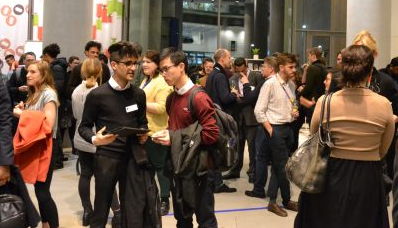Latest News
A-level students learn cutting-edge cancer research skills
The Cancer Research UK City of London Centre opens its doors to the next generation of cancer researchers this summer (Monday 7- Thursday 17 July).
Over fifty A-level science students will get hands-on laboratory experience at the Barts Cancer Institute, UCL and KCL as part of the STARS programme.
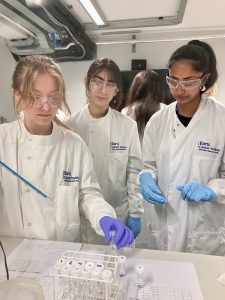
European Society for Medical Oncology (ESMO) Congress 2024: highlights
Faculty members including Professor Peter Schmid (BCI), Professor Tom Powles (BCI) and Dr Debashis Sarker (KCL) presented at the European Society for Medical Oncology (ESMO) Congress 2024.
Professor Powles shared results from the phase three NIAGARA study, which showed that combining the immunotherapy drug durvalumab with chemotherapy improves survival in people with muscle-invasive bladder cancer.
Meanwhile, Professor Schmid spoke about the phase three KEYNOTE-522 trial. This has found that giving patients with high-risk early-stage triple-negative breast cancer the immunotherapy drug pembrolizumab before and after surgery in combination with chemotherapy reduces the risk of their cancer coming back and improves overall survival.
Dr Sarker presented interim data from phase one of the mRNA-4359 trial looking at mRNA cancer immunotherapy, which has shown promise in patients with advanced solid cancers.

City of London Centre funds expansion of laboratory work experience for A-level students
The Science Training for Aspiring Research Scientists (STARS) programme aims to support young people from schools with historically low university attendance. Over the course of a week, participants have the opportunity to get hands-on experience in a working laboratory, meet researchers, and get advice from admissions teams on applying to university.
STARS first took place in 2013 at the Barts Cancer Institute at Queen Mary, University of London. This year, STARS is expanding for the first time to include University College London and King’s College London. This has been made possible by funding and coordination from the City of London Centre. The Centre has a commitment to supporting equality, diversity and inclusion, as well as fostering collaboration between its partner organisations. Read more here.
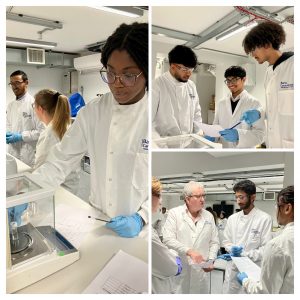
A drug that can “dissolve” tumours has been recognized as a significant advancement for certain bowel cancer patients.
A study led by University College London, University College London hospital amount others has shown that Pembrolizumab, an immunotherapy drug given before surgery instead of chemotherapy, triples chance of survival for the 10-15% of patients with the right genetic makeup (MMR deficient/MSI-High bowel cancer). Dr Marnix Jansen, a Clinician Scientist and Consultant Histopathologist who is leading the translational research on the trial from UCL Cancer Institute and UCLH, said: “More work needs to be done to assess pembrolizumab before it could be considered standard treatment, but given the quality of the outcomes in this trial I think it’s possible that we could see it in the clinic within a couple of years if subsequent trials are similarly successful.”Read more here.
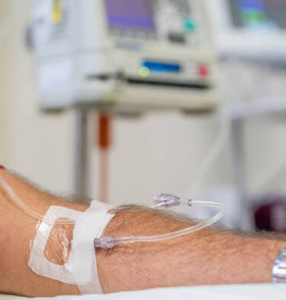
King’s biotech spinout Pheon Therapeutics Raises $120m to develop novel anticancer agents
Pheon Therapeutics, a biotech evolved from a King’s spinout company, based on the academic research of Professor Miraz Rahman, KCL, amounts others, has raised $120 million in Series B funding to further develop its pre-clinical and clinical pipeline. Pheon is focused on the development of specialised ADCs. The first ADC Pheon will test has demonstrated an unprecedented preclinical therapeutic index while utilising a DAR8 Topoisomerase-1 inhibitor linker-payload, whereas the next two ADCs utilise other linker-payload technologies to mine the broad potential of this target. The company expects to start its first Phase 1 clinical trial in 2024 and rapidly advance towards dose expansion cohorts. The capital will also enable the expansion of Pheon’s suite of in-house technology platforms to generate optimized ADC constructs. Read morehere.
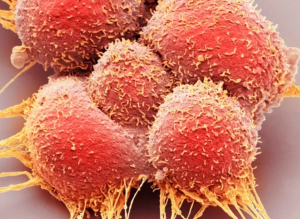
New tailored drug for aggressive breast cancer
A group of scientists led by Sophia Karagiannis, KCL, conducted a data analysis using over 6000 breast cancer samples to investigate the properties of breast cancer cells that are associated with aggressive and chemotherapy-resistant cancers. After studying the cancer biology of the cancer cells, they established the presence of the cancer cell surface marker EGFR along with oncogenic molecules cyclin-dependent kinases (CDK), which are responsible for cell division and proliferation.They used this knowledge against the cancer cells to link cetuximab, a tumour-selective antibody that targets the EGFR protein expressed in this type of cancer, with a CDK-blocking drug to create a tailored drug for breast cancer. Because the antibody drug conjugate specifically targets the cancer cell, it may be possible to administer a lower inhibitor dose than usual which means it’s less toxic for the patient. Read more here.

New immunotherapy could treat cancer in the bone
A new type of immunotherapy using gamma-delta T cells, developed by UCL researchers, and suppoted by UCLB, has shown promising preclinical results against a bone cancer called osteosarcoma, as part of a study in mice. Lead author, Dr Jonathan Fisher (UCL Great Ormond Street Institute of Child Health and UCLH), said: “Current immunotherapies such as CAR-T cells (another type of immunotherapy using genetically modified immune cells) use the patient’s own immune cells and engineer them to improve their cancer-killing properties. However, this is expensive and takes time, during which a patient’s disease can get worse. And, while it is an effective treatment for leukaemia it has been found to be less effective against solid cancers”. Read more here.

Potential surrogate endpoints in cancer screening trials?
Could we know if a clinical trial works sooner? Peter Sasieni, Director of the Cancer Research UK Cancer Prevention Trials Unit at QMUL, has published a study in the Lancet Oncology about using surrogate endpoints to assess the effectiveness of screening and accelerate the translational pathway where appropriate. Read more here.
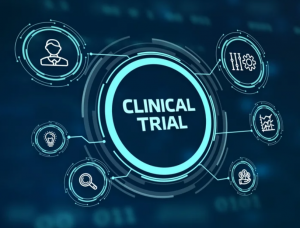
Palmitoyl transferase ZDHHC20 mediates metastasis of pancreatic cancer in vivo
A study led by Julian Downward, Centre member from Francis Crick Institute, suggests that enzymatic inhibitors of ZDHHC20 palmitoyltransferase activity could be effective in restraining the metastatic process in pancreatic cancer, which is responsible for the very poor outcomes seen in pancreatic cancer. Read more here.
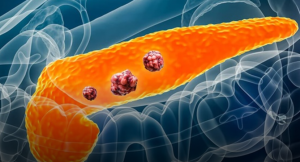
HPV vaccine stops 90% of cervical cancer cases
Prof Peter Sasieni has led a study which indicates that the human papillomavirus (HPV) vaccine works similarly well across the socio-economic spectrum, with most cases being prevented in more deprived groups. Until now, there have been concerns that the HPV jab could have an unequal impact across society, meaning it misses out on those in deprived groups where the disease is most prevalent. The jabs, which have been given to teenage girls since 2008, protect against high-risk strains of human papillomavirus, which spreads during sex and causes 99 per cent of cervical cancers. The study, published in the British Medical Journal (BMJ), looked at incidences of cervical cancer in more than 650,000 women who had received the jab between the ages of 12 and 18.It found that women in their 20s who got the jab aged 12 or 13 were 90 per cent less likely to get cervical cancer than unvaccinated women. Meanwhile, women who received catch-up vaccines between the ages of 14 and 18 cut their risk by as low as 30 per cent.
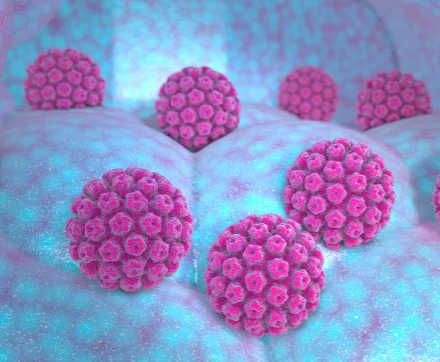
Cancer patients in prison more likely to die from the disease
A study led by Elizabeth Davies from King’s College London, University of Surrey and University College London, and funded by the National Institute for Health and Care Research (NIHR), shows that patients with cancer face several barriers to diagnosis in prison and once diagnosed, they receive significantly less treatment and lower planned care costs, and report worse experiences of care.. Read the full article here.

His Majesty King Charles III announced as new patron of Cancer Research UK
His Majesty King Charles III has become the Patron of Cancer Research UK and coinciding with the announcement, Their Majesties the King and Queen visited University College Hospital to raise awareness of early diagnosis and highlight some of the innovative research. During their visit they met Professor Charlie Swanton. Read the full article here.
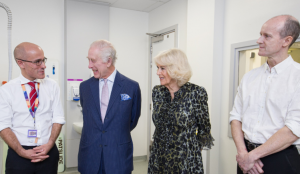
Cancer Research UK awards £10.5M to the City of London Centre for clinician scientist training
Cancer Research UK has announced that the Cancer Research UK City of London Centre is set to receive a £10.5 million-pound cash injection to train more doctors as clinician scientists, so they can develop careers undertaking cancer research alongside their clinical practice. Read the full article here.
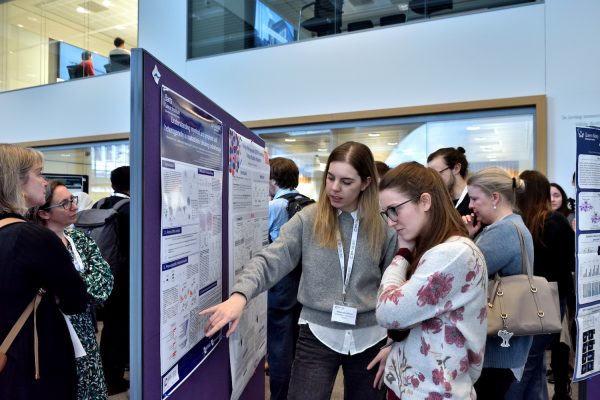
Key mechanism governing bone marrow stem cells opens door to new therapies
Eric So, Professor and Chair in Leukaemia Biology in the Comprehensive Cancer Centre, and his lab identified two molecules that control when bone marrow stem cells rest and recover, and when they spring into action and replicate. The researchers subsequently discovered an enzyme that mediates the functions of these molecules. Since bone marrow stem cell transplantation has been the key treatment for a large array of blood cancers, their findings open the door to a new pathway for their future therapeutics. Read here.

Scientists identify Achilles heel of lung cancer protein.
Researchers from KCL and others have shown for the first time that a crucial interface in a protein that drives cancer growth could act as a target for more effective treatments. Read here.
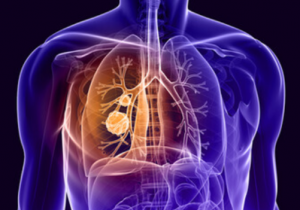
Charles Swanton was featured in The Times to discuss the importance of continued funding for cancer research.
With number of cancer diagnoses set to rise 50 per cent by 2040, more funding for cancer research is essential. Read here.
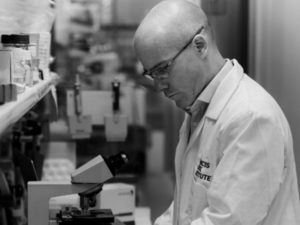
CRUK Biology to Prevention Award together with the CRIS Cancer Foundation will fund the development of a novel lung cancer vaccine
Kevin Litchfield and Mariam Jamal-Hanjani are among the group of scientists who will use the CRUK Biology to Prevention Award, joint with the CRIS Cancer Foundation, to develop LungVax, the world’s first vaccine to prevent lung cancer in high-risk populations by targeting hotspot neoantigens via the ChAdOx platform. Read more.

Cancer Grand Challenges 2024 – Meet the winning Teams
Five new teams – KOODAC, MATCHMAKERS, PROSPECT, PROTECT, and SAMBAI will receive up to $25m over five years from the Cancer Grand Challenge, to tackle some of cancer’s toughest challenges. Read more.

Congratulations to the winners of the 2024 Barts Cancer Institute staff awards
Research Supervisor of the Year Award: Dr Oliver Pearce (Senior Lecturer), Vice Principal’s Award for Excellence in Research: Dr Louise Barber (Senior Scientific Officer), Emerging Professional Services Leader Award: Dr Bex Gresham (Principal Laboratory Manager), Innovation and Enterprise Award: Professor Pedro R. Cutillas (Professor of Cell Signalling and Proteomics), Impact Award: Professor Thomas Powles,MD (Professor of Genitourinary Oncology), Impact Award: Professor Peter Szlosarek , Outstanding Early-Career Researcher: Dr Mirjana Efremova
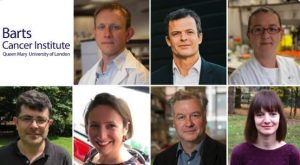
Dr Nicholas McGranahan honoured with Blavatnik Award
Dr Nicholas McGranahan, City of London Centre Theme 3 Co-Lead, has been named the Life Sciences Laureate at the 2024 Blavatnik Awards for Young Scientists in the UK. Read more here.
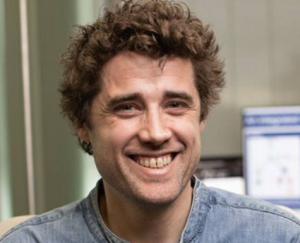
Highlights of the CRUK City of London Centre Annual Symposium – Future Leaders
Read the highlights from the 2024 symposium here and save the date for the 2025 Centre Symposium 27-28 January 2025 in person at the Crick.
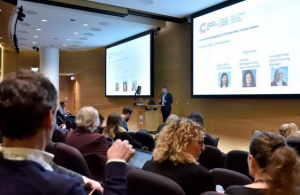
The ATOMIC-Meso Randomized Clinical Trial: a study to fight asbestos-related cancer
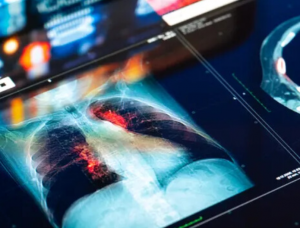
Lucia Cottone, UCL, proud recipient of the Rising Research Star Award.
Lucia was recognised by the Bone Cancer Research Trust for spearheading research that is important to patients and for always maintaining a patient-first mindset.
“Receiving this award is a great honour and I am grateful to those who supported my nomination. This award really boosts my motivation to work even harder, alongside many amazing scientists and clinicians at UCL and beyond, to fight bone cancer”
Read more here
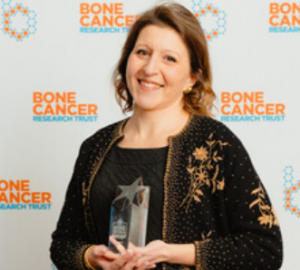
King’s 3D medical modelling spin-out acquired by international MedTech company KARL STORZ
Innersight Labs, a cutting-edge AI-powered medical software company spun-out from the School of Biomedical Engineering & Imaging Sciences at King’s College London, has been acquired by leading international MedTech company KARL STORZ.
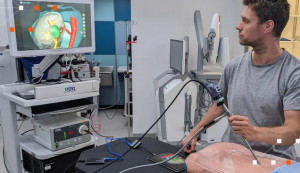
AI can predict brain cancer patients’ survival
Dr Booth (City of London faculty) and his team at King’s College London have created an AI model which can more reliably and accurately predict outcomes for patients with adult primary brain cancer more than eight months after receiving radiotherapy treatment. Read more here.
CoL investigators have opened a phase I clinical study of GD2-CAR T cells for patients with Diffuse Midline Gliomas.
Charlotte Spencer, clinical fellow at Turajlic Lab, featured in the Guardian talks about how AI could soon help diagnose and treat certain types of cancers.
Read this interesting article where Charlotte Spencer discuss how AI is shaping the future of cancer diagnosis and treatment – ‘IT gives doctors the gift of time’ .
King’s signs commercial contract with cellular immunotherapy startup Korecyte Bio
Korecyte Bio’s HypoxiCAR is a new approach to CAR-T immunotherapy. The treatment focuses the killing potential of these cells on the tumour, avoiding cell exhaustion and reducing their activation outside the tumour thereby lowering the toxicity of these therapies, even at high doses, to collectively improve their anti-tumour efficacy. The technology was developed at King’s by Drs James Arnold, Paris Kosti and John Maher in the School of Cancer & Pharmaceutical Sciences. Read more here
Immune cell helps predict skin cancer patients chances of responding to treatment
A type of immune cell can help predict which patients may benefit most from cancer immunotherapies, researchers from King’s College London, Guy’s and St Thomas’ Hospital Trust, and the Francis Crick Institute have found. The study has been published in Nature Cancer
CONIPHER, a computational framework for scalable phylogenetic reconstruction with error correction
Nicholas McGranahan’s lab has led on the development of CONIPHER, a tool to automate tumour phylogenetic reconstruction while dealing with various sources of noise and errors, and scaling to large numbers of samples and mutations. This method has been published in Nature Protocols
Professor Hemant Kocher at the BCI shed new light on the disease that could help us to detect it earlier and treat it more effectively.
This study, which was published on World Pancreatic Cancer Day 2023 in Frontiers in Immunology. investigates a class of star-shaped cells known as pancreatic stellate cells that are coerced by the cancer to become active and build the protective fortress of scar-tissue surrounding the tumour. Read more here.
Research led by the Crick Institute identifies the role of vitamin B5 in breast cancer growth
Mariia Yuneva, senior group leader of the Oncogenes and Tumour Metabolism Laboratory at the Crick, City of London faculty, and co-investigator in the Cancer Grand Challenges Rosetta team, is the correspondence author of this Nature paper which shows that breast cancer cells expressing a cancer-driving gene (Myc) heavily rely on vitamin B5 to grow and survive.
NHS approves preventive breast cancer drug for 300,000 at-risk women
The results of IBIS II prevention clinical trial, co-led by Jack Cuzick, will benefit tens of thousands more women at increased risk of breast cancer as a proven risk-reducing drug on the NHS, Anastrozole, has been licensed by the Medicines and Healthcare products Regulatory Agency (MHRA), in a new use to help prevent the disease . Read more here
The making of Charlie Swanton
Read in this article how Charles Swanton went from a “disappointing and very late, mid-term report” to a hugely successful PhD and career in cancer evolution.
New study led by Vicky Sanz Moreno identifies cells that drive spread of pancreatic cancer
Prof Victoria Sanz Moreno group (QMUL) has identified cells that drive the spread of pancreatic cancer and discovered a weakness in these cells that could be targeted using existing drugs. This offers a promising new approach for treating pancreatic cancer. Read more
Professor Peter Sasieni wins the Don Listwin Award in recognition of his work in cancer prevention and early detection
Peter Sasieni (CRUK CoL Centre Theme Lead) has had significant impact on the design and execution of clinical trials in cancer early detection and prevention. Peter led the clinical trial showing the impact of HPV vaccination on reducing cervical cancer rates in England. Read more
Potential treatments for children with rare genetic conditions identified by Crick and GOSH research teams
A team of researchers, led by Veronica Kinsler (Crick, CoL Centre member), have designed potential therapy to prevent brain deterioration in children with rare genetic conditions. The study has been published in the Journal of Investigative Dermatology. Read more here
Queen Letizia of Spain visits Cancer Research UK
Her Majesty Queen Letizia of Spain, honorary president of the Spanish Association Against Cancer (AECC) and it’s scientific foundation, visited Cancer Research UK today to commemorate the upcoming World Cancer Research Day. Read more
Cancer Research UK’s 11 Downing Street reception
CRUK held a reception at 11 Downing Street for some of our closest supporters to celebrate the progress we continue to make for cancer patients through transformational science, as well as the exciting future of cancer research. Read more
Research from Stuart McDonald’s lab at Barts Cancer Institute has solved a long-standing mystery of how the liver creates new cells
This knowledge will be vital to understanding how and why cell growth spirals out of control in cancer. Read more here
Protein that enhances skin cancer aggressiveness identified by researchers from King’s, Queen Mary University of London and the Francis Crick Institute, and funded by Cancer Research UK
Researchers have identified a protein that makes melanoma more aggressive by giving cancer cells the ability to change the shape of their nucleus, overcoming the physical constraints that cancer cells encounter when they migrate through tissues.
CAR-T blood cancer treatment trial led by UCL and UCLH researchers broaden to new group of patients
New groups of patients with a wider range of blood cancers can now take part in the clinical trial of a personalised therapy for blood cancer, led by researchers at UCL and University College London Hospitals.
Achilles Therapeutics awarded the CRUK Horizons Startup Achivement of the year
Congratulations to Achilles Therapeutics, whose CSO is CRUK CoL Centre member Sergio Quezada, for this award in recognition of its #AI-powered platform which is working to develop novel, personalised T cell therapies.
https://www.cancerresearchhorizons.com/innovation-entrepreneurship-awards-2022
Seven Centres to form new Cancer Research UK network
https://news.cancerresearchuk.org/2022/01/24/seven-centres-to-form-new-cancer-research-uk-network/
From 1 April, we’re investing £100 million over five years into seven Cancer Research UK Centres across the UK. The Centres in the new network will be Cambridge, City of London, Convergence Science, Manchester, Newcastle, Oxford and Scotland.
Our Centres funding supports essential research infrastructure including technical staff, equipment, pump-priming grants, and training, to further develop the breadth and depth of research at each of these Centres.
Separately from Centre status, we also fund individual research programmes, projects, and strategic initiatives in different locations throughout the UK.
Our Centres bring together a network of research teams from local universities, NHS hospitals and other research organisations. They seek to understand the impact and efficacy of treatments to initiate new research ideas and programmes, translating cutting-edge discoveries from the laboratory into direct benefits for patients.
The seven funded Centres are central to our ambition to beat cancer, providing a key link between laboratory research and patient-focused studies.
– Michelle Mitchell, Chief Executive Officer, Cancer Research UK
We award Centre funding on a five-year basis; the upcoming funding period will run from 1 April 2022 – 31 March 2027. To make sure that we fund science with the greatest impact, applications were assessed in a two-stage process culminating in interview and review by an international panel of leading translational experts. The process was highly competitive, and the review panel commended the high-quality of the proposals and strength of the overall network.
Standards were particularly high, in part, because our investment of £100 million is a reduction of around a third compared to the last funding round in 2017. While the pandemic has required us to reshape our research model and make tough decisions about the research we fund, this investment continues to provide vital infrastructure for bench to bedside research, as well as creating opportunities for the next generation of scientists.
CRUK City of London Centre 2021 Cancer Evolution Symposium
The CRUK City of London Centre held the first two-day Cancer Evolution Symposium on Monday 13th – Tuesday 14th September 2021. This international hybrid event hosted at the Francis Crick Institute saw 30 speakers from across the globe presenting to in person attendees and nearly 600 virtual attendees.
This event showcased the breadth and depth of cancer evolution research happening across the Centre and beyond. Professor Charles Swanton began the event with an overview of the research being conducted at the CoL Centre in this field, followed by talks from international leaders and early career researchers. The event brought together researchers in person, some for the first time in over a year, to initiate new collaborations and broaden fields of research in cancer evolution.
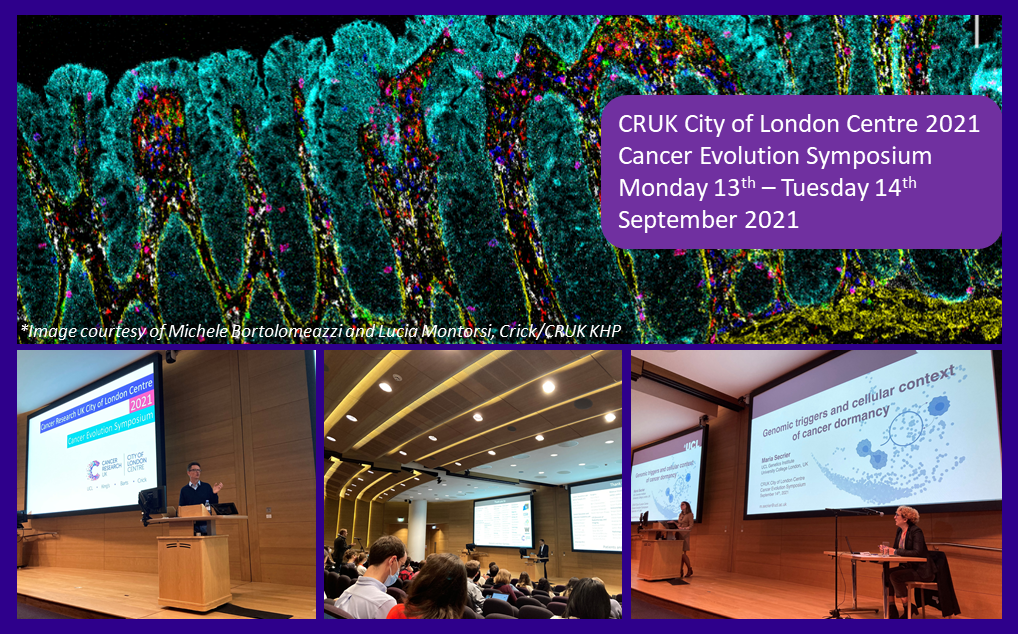
NCITA Publishes Comment Article in the British Journal of Cancer
NCITA are delighted to announce the publication of their Comment article “Introduction to the National Cancer Imaging Translational Accelerator (NCITA): a UK-wide infrastructure for multicentre clinical translation of cancer imaging biomarkers” in the British Journal of Cancer https://www.nature.com/articles/s41416-021-01497-5#Sec1 on Tuesday 27 July 2021.
This Comment article provides a comprehensive overview of the NCITA infrastructure and its goals to establish standardised protocols and locked-down quality-assured processes for clinical imaging biomarker qualification and a federated research data repository for secure data storage and sharing between multiple study sites.
NCITA infrastructure support is available to clinical researchers in academia and industry through NCITA’s study adoption process. International partners are also eligible to apply. While cancer imaging studies are a key focus, clinical research studies in other disease areas involving AI algorithm development, training and validation will also be considered for adoption by NCITA.
NCITA are also engaging with NHS Trusts, pharmaceutical companies, medical imaging and nuclear medicine companies as well as funding bodies and patient groups, to develop consensus guidelines on how the imaging biomarker development pathway can be improved to achieve more efficient translation of quality-assured imaging biomarkers into clinical practice.
Researchers interested in finding out more about NCITA infrastructure support for clinical imaging research studies can contact NCITA by email (ncita.general@ucl.ac.uk) or via the website (ncita.org.uk/contact).

Prime Minister receives COVID-19 vaccine from CRUK City of London Centre trainee at the Francis Crick Institute
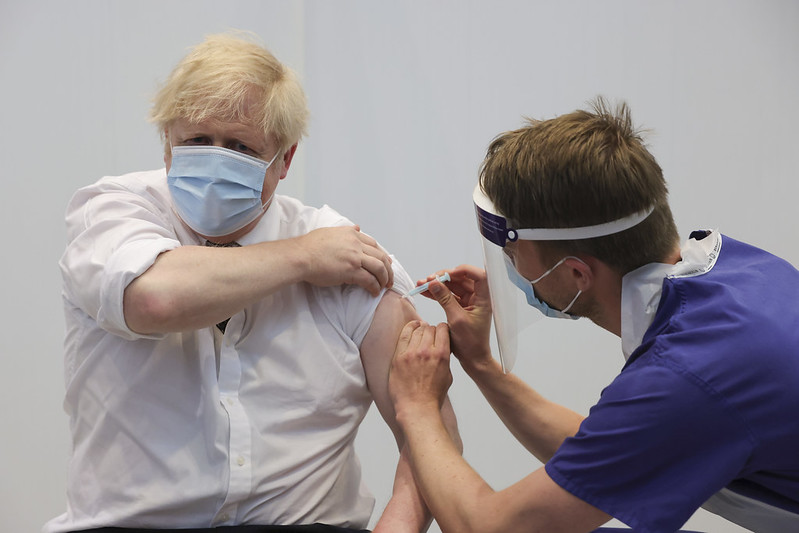
Picture by Andrew Parsons / No 10 Downing Street
UK Prime Minister Boris Johnson received his second dose of COVID-19 vaccine today at the NHS vaccination centre at the Francis Crick Institute.
Johnson was vaccinated by James Black, a CRUK City of London Centre clinician scientist based at the Crick and UCL Cancer Institute who studies lung cancer evolution.
James is one of more than 300 Crick members of staff who have been trained by the NHS in order to volunteer in the vaccination centre. “As someone who works both in the lab and the clinic, it’s been amazing to see first-hand how scientific research has changed the course of the pandemic,” said James.

Job Opportunity: Research Fellow – Senior Scientific Officer in Data Integration
CRUK RadNet City of London Radiation Research Unit: Current Vacancies
The CRUK RadNet City of London Radiation Research Unit have three different types of posts that they are looking to fill:
- 2x Junior Group Leaders in radiation biology/oncology
- 2x NIHR Academic Clinical Lectureships
- 1x Research Fellow in radiation biology & cancer immunology
Please find further information, including contacts for informal enquiries, on our webpage here.
Please cascade to colleagues and friends who may be interested in joining our Radiation Research Unit.

Job Opportunity: CRUK City of London Centre Postgraduate Training Manager
New Job Opportunity: CRUK City of London Centre Postgraduate Training Manager post.
This is a full-time, fixed term position based at the Francis Crick Institute (the Crick) and the Cancer Research UK City of London (CRUK CoL) Centre (lead by UCL).
Summary
This role provides an excellent opportunity for a highly motivated, effective and ambitious individual wanting to develop a career in the development, operation and management of collaborative postgraduate education programmes. The Postgraduate Training Manager will be responsible for the Centre PhD programme for scientists and clinicians. This role will suit a dynamic individual with a strong interest in postgraduate training and development who is willing to work across multiple institutions and develop their networking, collaborative and operational skills.
Applications now closed.
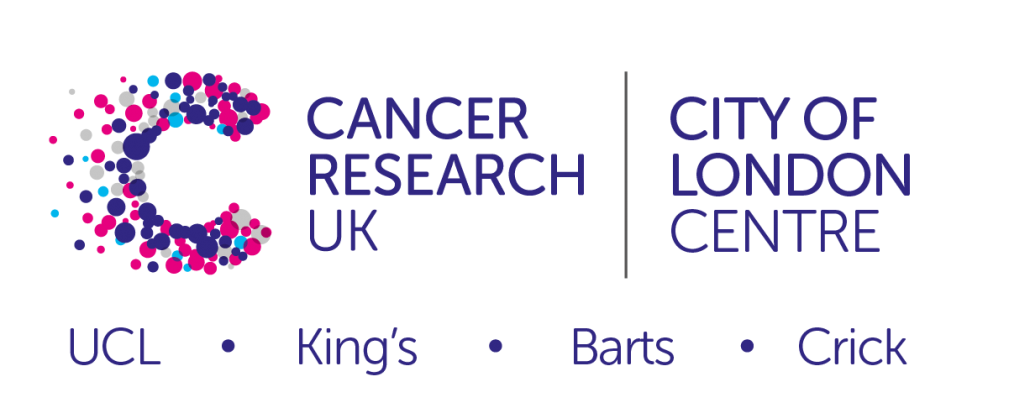
CRUK City of London Centre PhD Students

CRUK City of London Centre PhD Students
CRUK City of London Centre Clinical Research Training Fellow Michael Austin talks about their move from a clinical to research environment to take on a PhD within the City of London Centre.

CRUK City of London Centre PhD Students
Eva Bugallo Blanco talks about their experience as a CRUK City of London Centre PhD student based at Guy´s Hospital (King´s College London, KCL) and Barts Cancer Institute (BCI).

RadNet City of London Opportunities
RadNet City of London spans across 4 leading central London institutes, namely UCL, King’s, Barts and the Crick, and unites multi-disciplinary expertise across London to cultivate a modernised radiation research landscape. Our research focus is predicated on the view that cancer cure by radiotherapy can be improved by concentrating on the following themes:
- Radiation Resistance Including cancer evolution and cancer stem cells
- Radiation Combinations How the TME and immune system affect response to radiotherapy
- Targeting and Technology Advanced radiotherapy techniques, including PBT, that converge on the tumour for children and young people’s cancers
- Outcomes and risk predictions Personalising radiotherapy using artificial intelligence, computational models and improved tumour imaging.
- Clinical translation Establish a clinical trials platform, to ensure a strong forward and reverse translational element to the above themes
Group Leaders
We are seeking top scientists with a major focus in radiation biology and radiation oncology who would be interested to join our team. We have a group leader position available and wish to explore how their ambitions align with our strategy.
Clinical Academics in Radiotherapy
We are seeking staff from our NHS Trust partners, who have a major focus in radiation biology and/or radiation oncology research. We have clinical PAs available and wish to explore how their ambitions align with our strategy.
For expressions of interest, please contact the RadNet City of London Project Manager, Michelle Craft, on cruk-radnet-cityoflondon@ucl.ac.uk.
Website: https://crukradnet.colcc.ac.uk/
Follow us on twitter @RadNetCRUKCoL

First year clinical fellow, Vinaya Srirangam Nadhamuni, reaches the national final of the 3 Minute Thesis Competition
Congratulations to Vinaya Srirangam Nadhamuni, a CoL Centre Clinical Research Fellow at Barts Cancer Institute (BCI), Queen Mary University of London, who has progressed to the national final of the 2020 Vitae Three Minute Thesis® (3MT®) competition. As one of six finalists, Vinaya will be delivering a presentation about her research project live and online on Wednesday 16th September. 3MT® is an academic competition developed by the University of Queensland, Australia, that challenges PhD students to deliver a compelling spoken presentation on their research topic and its significance in just 3 minutes. Vinaya’s presentation is entitled ‘The war on cancer: understanding the immune system’s strategies for fighting bowel cancer.’
As a histopathology trainee, Vinaya had completed 18 months of training in histopathology before pursuing a PhD as part of the Cancer Research UK City of London Centre Clinical Research Training Fellowship Programme. Vinaya is undertaking her research project in Professor Trevor Graham’s laboratory group in BCI’s Centre for Cancer Genomics and Computational Biology.
Ahead of the final, Bethan Warman, Communications Manager at the BCI, spoke to Vinaya to find out more about her research and her experience in the competition.
What prompted you to enter the Vitae 3MT® competition? How have you found the experience so far?
I am often asked by my friends and family about the project I’m working on. My main aim in entering the competition was to come up with a short description that would explain this clearly (and maybe even wow them!). However, I have gained much more from this experience than I could have expected. Having to stop and think about the relevance of my work and how it fits into the bigger picture has been really useful, especially in terms of keeping me motivated to work even harder on my project.
Can you tell us a bit about your research project?
My project aims to understand how bowel cancer interacts with and escapes from the immune system. I am studying this by staining the different cell types in bowel cancer tissue with markers of different colours simultaneously and reviewing the stained tissue under the microscope. This will allow me to characterise the different immune cell types present- not only their quantity but also crucially their spatial interactions with each other and cancer cells.
This approach will help us identify mechanisms used by cancer cells to “escape” from the immune system. In turn, these insights will hopefully guide the development of treatments targeting these escape mechanisms. Eventually, this approach can be translated to a clinical setting such that we can determine the escape mechanisms present in a particular patient’s cancer and provide targeted treatment, ultimately decreasing the significant mortality associated with bowel cancer.
From a histopathology point of view, a great deal of the clinical work in a pathology department involves looking at tissue under the microscope and using this information to diagnose cancer and identify risk factors which predict a worse prognosis. My project gives me the opportunity to take this process one step further by grouping the cells I see under the microscope into subtypes and understanding how they interact. I hope that this will deepen our understanding of the biological processes underlying the image that we see under the microscope.
How do you feel to have made it through to the 3MT® competition national final?
I am thrilled to have made it this far, especially considering 53 universities participated this year and only six finalists could be selected from the pool of candidates! I couldn’t have done it without the support of my fantastic lab. From helping me with my project at every turn to turning up to support me at the Queen Mary final, they have been absolutely amazing! I couldn’t ask for a more supportive team and am very grateful to have this opportunity to work with them during my PhD.
We wish Vinaya the best of luck in the final on 16th September. If you would like to watch the final and show your support, you can register online.
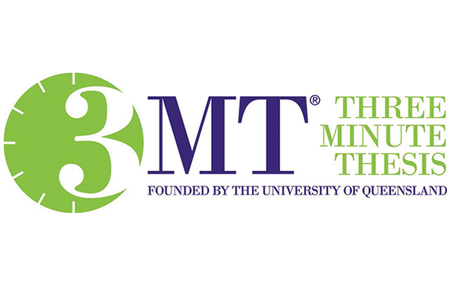
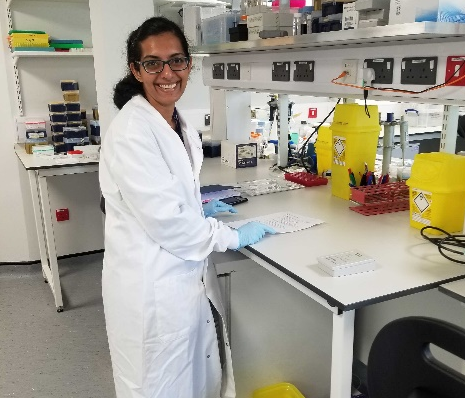
Launch of the CRUK Open Lab Initiative
Cancer Research UK has recently launched the Open Lab Initiative, a new collaborative research venture, across its network of Centres. The aim of the Open Lab Initiative is to connect CRUK Centre Network research groups with mutual or complementary interests and expertise, from across the UK, to spark creative discussions, generate novel scientific ideas, and establish new research collaborations during the coronavirus (COVID-19) pandemic and beyond.
The Open Lab Initiative removes all the fuss and hassle from finding new research collaborators – proprietary matching algorithms and Open Register make meeting your ideal research partner a breeze!
If you are interested in joining, simply sign up to join the Initiative using the online webform and within 5 working days the team will match you to another research group to hold a joint virtual group meeting or journal club. Alternatively you can add your research group to the Open Register to allow others to match with you directly.
For more information and to sign up, please see: www.crukcc.org/openlab

First Year CoL Centre PhD student wins QMUL 3 Minute Thesis Competition 2020
Congratulations to our first year PhD Clinical Research Training Fellow, Vinaya Srirangam Nadhamuni, who has won QMUL’s 3 minute thesis competition. Vinaya was one of 5 QMUL students shortlisted for the final and was not only the winner of the overall competition but also took the People’s Choice award. The finals took place over zoom, with over 70 people logging in to listen to the talks. She will now go on to represent QMUL in the national semi-finals.
Integrating Cancer Imaging Biomarker Clinical Research Across the UK
UK National Cancer Imaging Translational Accelerator (NCITA) establishes infrastructure for validation and adoption of cancer imaging biomarkers as decision-making tools in clinical trials and NHS practice.
Researchers and medical experts from nine world-leading medical imaging centres across the UK come together to form an integrated infrastructure for standardising and validating cancer imaging biomarkers for clinical use.
The centres include University College London, University of Manchester, University of Oxford, King’s College London, The Institute of Cancer Research, London, and The Royal Marsden NHS Foundation Trust, Imperial College London, Cambridge University, Newcastle University and University of Glasgow. This unique UK infrastructure provides clinical researchers across the UK with open access to world-class clinical imaging facilities and expertise, as well a repository data management service, artificial intelligence (AI) tools and ongoing training opportunities.
The NCITA consortium, through engagement with NHS Trusts, pharmaceutical companies, medical imaging and nuclear medicine companies as well as funding bodies and patient groups, aims to develop a robust and sustainable imaging biomarker certification process, to revolutionise the speed and accuracy of cancer diagnosis, tumour classification and patient response to treatment.
Professor Shonit Punwani, Chair of the NCITA governance group said, “The UK is at the forefront of imaging research, with new techniques and technologies often making the news. Yet, the pace of change in clinical practice remains painfully slow. To date we have been missing the infrastructure to deliver these new technologies to the clinic. NCITA fills this gap by defining a translational pipeline with the singular aim of making our discoveries fit for clinical application. This can only be done with a creative and collaborative approach across academia, industry and the NHS.”
The NCITA initiative is funded by Cancer Research UK and will receive up to £10 million over 5 years. The NCITA network is led by Prof Shonit Punwani, Prof James O’Connor, Prof Eric Aboagye, Prof Geoff Higgins, Prof Evis Sala, Prof Dow Mu Koh, Prof Tony Ng, Prof Hing Leung and Prof Ruth Plummer with up to 49 co-investigators supporting the NCITA initiative. NCITA is keen to expand and bring in new academic and industrial partnerships as it develops.
To stay up-to-date with NCITA news, follow us on Twitter and see our website http://ncita.org.uk
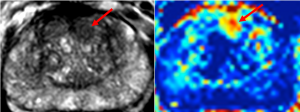
MRI imaging of patient with biopsy proven prostate cancer.
The left image is an axial T2-weighted MRI image showing a homogenous low signal area in the left anterior para-midline transition zone of the prostate. The right image is a novel VERDICT (Vascular, Extracellular and Restricted Diffusion for Cytometry in Tumours) MRI map at the same level showing a focal area (arrow) with increased intracellular volume fraction, which enables clearer definition of the tumour area.
Image credit: Images from the INNOVATE trial (https://bmccancer.biomedcentral.com/articles/10.1186/s12885-016-2856-2), courtesy of Professor Shonit Punwani and Dr Saurabh Singh, University College London, Centre for Medical Imaging

Registration open for the 2nd Crick International Cancer Conference 15th-17th September 2019
The second Crick International Cancer Conference will take place on 15-17th September 2019. A host of world-leading scientists and clinicians will present their latest work covering links between genomic integrity and cancer, building new cancer models, and improving therapies. The conference will also provide extensive opportunities for early career researchers to present both talks and posters alongside a world class line up of speakers. Abstracts are actively encouraged and there will be a prize for the best selected talk and best poster. A networking reception will further enable the attendees to make new links across disciplines, stimulating fresh ideas about the biology that underpins cancer development, and new ways to tackle the disease.
For booking and more information visit the website.
Early bird price £150 ends 31 July, full price £180 – registration closes 31 August.
If you would like to present a short talk or poster please submit an abstract of no more than 250 words to events@crick.ac.uk by 31 July 2019.
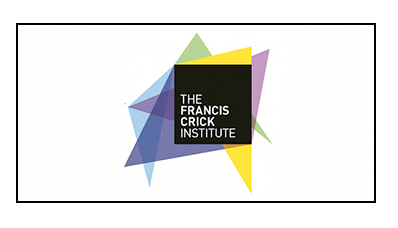
Launch of the CRUK City of London Centre Computational and Data Resource – 3rd September 2019
On the 3rd September 2019 the CRUK City of London Centre is launching its computational and data resource. This resource will be a key element in the cancer evolution theme and will enable cancer’s dynamics to be mapped longitudinally during exposure to biological therapies, integrated within the partners’ NHS service. The launch will kick off with a short presentation explaining what the resource offers and how to access it. Following the presentation, attendees can participate in a Data Challenge; We are encouraging early-career researchers (e.g. PhD students and post-docs) across the partners to form groups and embark on a collaborative effort within the cancer evolution theme to make use of the exciting computer resources available. The launch will be open to CoL Centre Faculty and their lab members only. If you would like more information on the event or to register, please email us.

2019 intake of PhD and Clinical Research trainees recruited to the CoL Centre training programme – June 2019
The first cohort of PhD students and Clinical Research Training Fellows have been appointed to start the CoL Centre Training Programme in September 2019. Two excellent candidates were selected from over 240 applications and will start their PhD in labs based at the Crick and King’s College London. Eight Clinical Research Training Fellows have also been appointed across the Centre. All 2019 CoL trainees will attend an induction week in September and will participate in the next CoL symposium in February. More information on the trainees and their projects will be available on the website in the next few months.

CRUK CoL Centre on Twitter – 15 March 2019
The CRUK City of London Centre is now on twitter! Follow us @CRUKCOLcentre to get all the news and events on the Centre, and to find out more about the latest cancer biotherapeutics breakthroughs.

CoL Centre Launch Symposium – 19th February 2019
On Tuesday 19 February 2019, 97 researchers from across the consortium were brought together for the first event from the Cancer Research UK City of London (CRUK CoL) Centre. This event showcased the breadth and depth of cancer biotherapeutics research happening across the Centre. Professor Tariq Enver kicked off the meeting with an overview of the CoL Centre strategy, this was followed by some fascinating talks from each of the Centre’s three research programmes. The symposium concluded with talks from the paediatric and training leads. It is envisaged that in the coming years this annual symposium will grow and facilitate novel initiatives and collaborations to promote and accelerate cancer biotherapeutics research.
